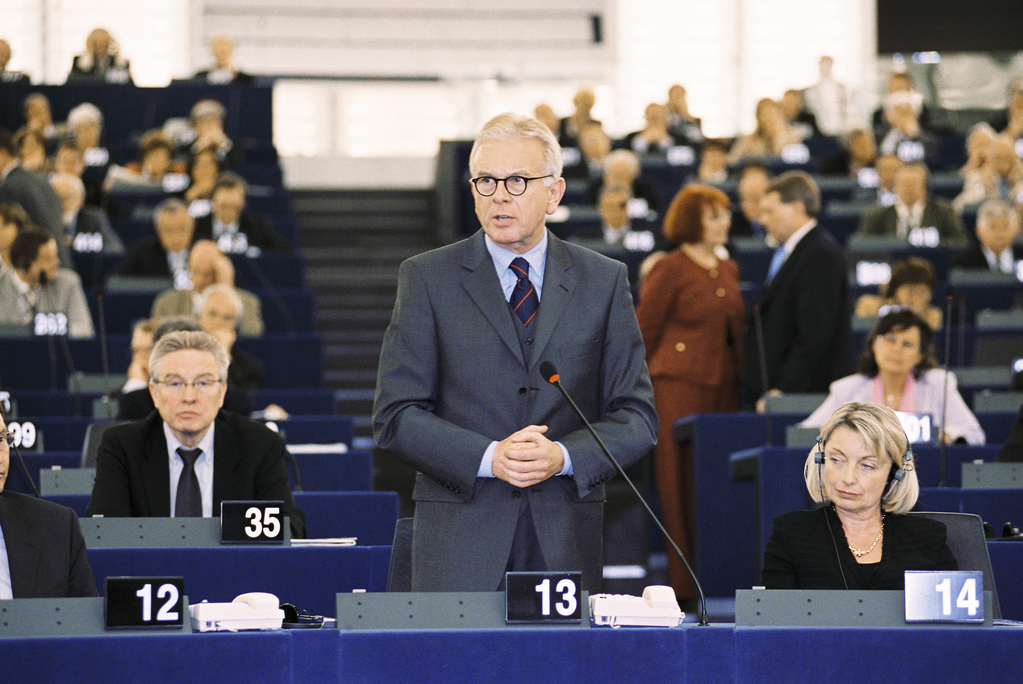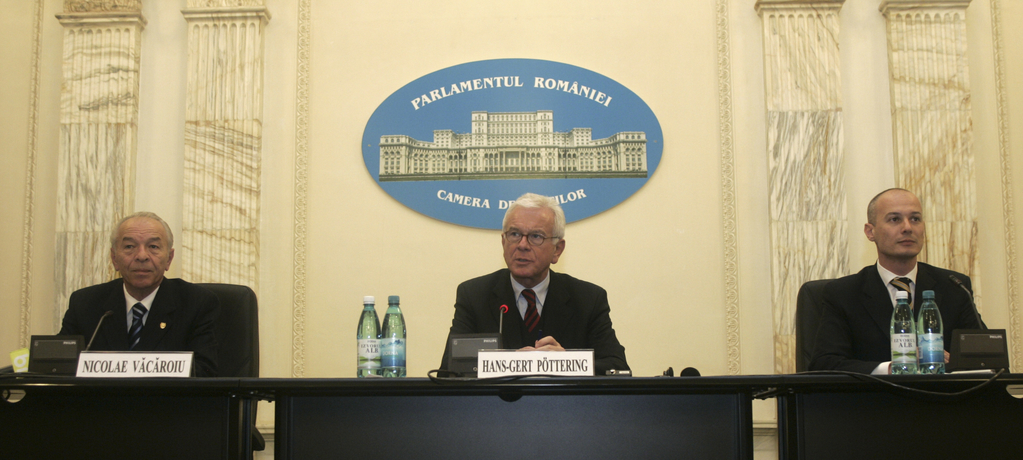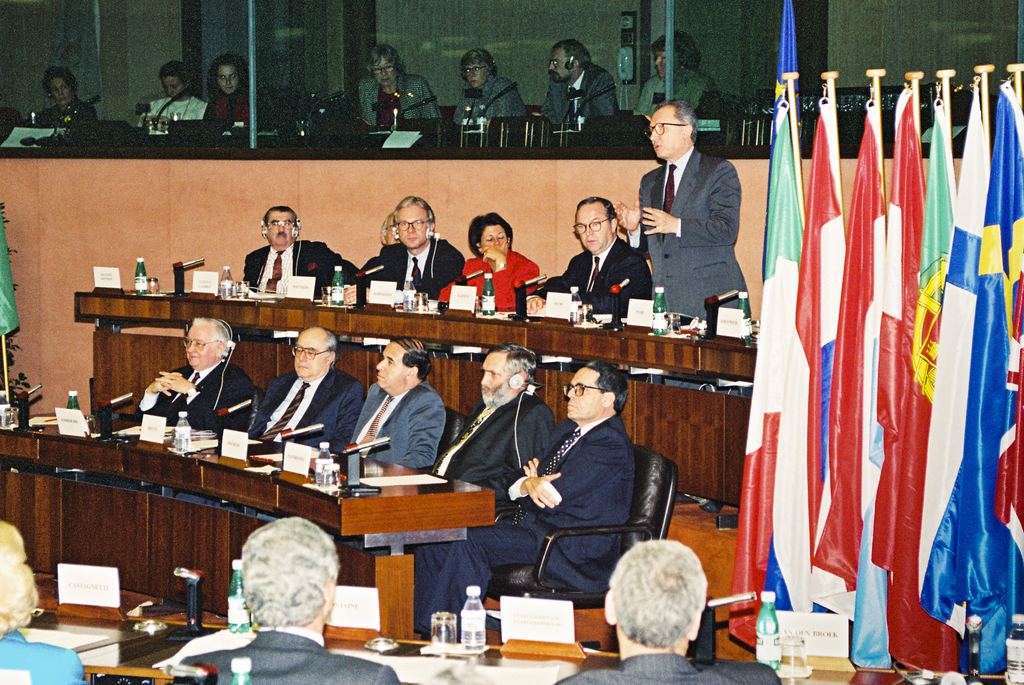Biography
Hans-Gert Pöttering was born on 15 September 1945. He studied law, political science and history at the University of Bonn, the University of Geneva, the Graduate Institute of International Studies in Geneva and at Columbia University in New York. He took his first state exam in jurisprudence in 1973 and earned a PhD in political science and history. In 1989 he was appointed Lecturer at the University of Osnabrück and became an honorary professor of the University in 1995.
He served as a Member of the European Parliament continuously from the first direct elections in 1979 until 2014. In 1994 he became Vice-President of the EPP and from 1999 to 2007 was Chairman of the European People's Party-European Democrats. He succeeded Josep Borrell Fontelles as President of the European Parliament in the second part of the 2004–2009 term. When he stepped down in 2014 he was the European Parliament's longest-serving member.
As president of the European Parliament he proposed the creation of the House of European History museum in Brussels, and has since served as Chairman of the Board of Trustees. From 2010 to 2017 Pöttering was Chair of the Konrad Adenauer Foundation. Pöttering was Chairman of the Former Members Association (FMA) of the European Parliament from 2018 to 2022.
Political positions held
- 1974 - 1976: Chairman of the Young Christian Democrats regional committee, Osnabrueck county
- 1974 - 1980: Chairman of the Christian Democrats local committee, city of Bersenbrueck
- 1976 - 1980: Speaker on European affairs of the Young Christian Democrats of Lower Saxony
- 1979 - 2014: Member of the European Parliament (Only deputy who has been Member of the European Parliament continuously since the first direct election in 1979 till 2014)
- 1981 - 1991: Chairman of "Europa-Union" Lower Saxony
- 1984 - 1994: Chairman of the subcommittee on "Security and Disarmament"
- 1990 - 2010: Chairman of the CDU in the district of Osnabrueck
- 1994 - 1996: Supervisor of EPP/EPP group's working group on "Intergovernmental Conference 1996", drafting of the EPP position on the Amsterdam Treaty
- 1994 - 1999: Vice-Chairman of the EPP group in the European Parliament
- 1996 - 1999: Supervisor of EPP/EPP group's working group "Enlargement of the European Union"
- 1997 - 1999: President of "Europa-Union" Germany
- 1999 - 2007: Chairman of the EPP-ED group in the European Parliament
- 1999 - 2009: Member of the Federal Board of the Christian Democratic Union (CDU, Germany), Member of the Federal Executive Commitee
- 1999 - 2009: Member of the Executive Commitee of the European People´s Party EPP
- 2007 - 2009: President of the European Parliament
- 2008 - 2009: President of the Euro-Mediterranean Parliamentary Assembly EMPA
- 2008 - 2014: Chairman of the Working Group on the Middle East in the European Parliament
- 2010-2017: Chairman of the Konrad-Adenauer-Stiftung
- 2018 - 2022: Chairman of the Former Members Association (FMA) of the European Parliament
- Since 2010: Member of the Board of Directors of the Association for the "International Charlemagne Prize" of Aachen
What's in the Archives
The Archive received 90 files from the Office of President Pöttering. Briefings for the President are of particular importance as they are summaries of meetings and meetings held by members and directors and sent to Cabinet for information. We also note the chronological collection of the President’s letters, especially the replies to invitations and letters of thanks. The Cabinet has compiled files which follow all aspects of the President’s agenda such as visits, speeches, interviews and media relations.
Find more documents on Pöttering’s presidency in the Konrad Adenauer Foundation
 Plenary session at the European Parliament in Strasbourg - Opening of the first sitting of the enlarged European Parliament. Dirk Sterckx (L), Hans-Gert Pöttering (C), Françoise Grossetête (R) © European Communities 2004 – European Parliament
"We in the European Parliament defend European common values. We will never let volume and noise prevail over a democratic Europe."
Plenary session at the European Parliament in Strasbourg - Opening of the first sitting of the enlarged European Parliament. Dirk Sterckx (L), Hans-Gert Pöttering (C), Françoise Grossetête (R) © European Communities 2004 – European Parliament
"We in the European Parliament defend European common values. We will never let volume and noise prevail over a democratic Europe."
 Hans-Gert Pöttering, EP President, makes an official visit to Romania - Joint press conference with the President of Romania's Senate Nicolae Văcăroiu and Lower Chamber President Bogdan Olteanu. © European Union 2007 – European Parliament
Hans-Gert Pöttering, EP President, makes an official visit to Romania - Joint press conference with the President of Romania's Senate Nicolae Văcăroiu and Lower Chamber President Bogdan Olteanu. © European Union 2007 – European Parliament
 EPP group meeting - Outgoing EC President Jacques Delors is awarded the Robert Schuman medal. Pictured: (Top row, L-R) Edward Kellett-Bowman, Hans-Gert Pöttering, Ria Oomen-Ruijten, Wilfried Martens, Jacques Delors; (Bottom row, L-R): Egon Klepsch, Peter Schmidhuber, Sir Leon Brittan, Franz Fischler. © European Communities 1995
EPP group meeting - Outgoing EC President Jacques Delors is awarded the Robert Schuman medal. Pictured: (Top row, L-R) Edward Kellett-Bowman, Hans-Gert Pöttering, Ria Oomen-Ruijten, Wilfried Martens, Jacques Delors; (Bottom row, L-R): Egon Klepsch, Peter Schmidhuber, Sir Leon Brittan, Franz Fischler. © European Communities 1995
